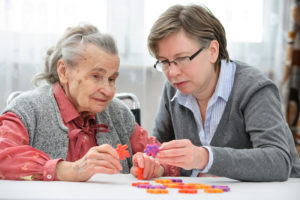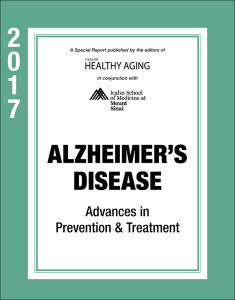Dementia Care: Don’t Neglect Yourself When Serving as Caretaker for a Loved One
About one-third of adults age 65 and older are family caregivers, many of whom are looking after relatives with Alzheimer’s disease or another form of dementia. Unfortunately, dementia care can be a heavy load for caregivers. The stress of looking after someone with dementia can take its toll, particularly as the disease progresses and as behavioral symptoms begin to occur. A range of practical strategies can help caregivers manage these behavioral symptoms—but it’s also vital to think about your own wellbeing.
Caregivers often are inclined to place their loved one’s needs before their own. As they juggle the patient’s medications, doctor appointments, comfort, and safety, they frequently neglect their own physical and emotional health. For example, you may feel you can’t take time away from your loved one in order to attend support group meetings—but I recommend you do. Studies show that caregivers’ health declines faster than the patient, so if you’re a caregiver, you need to be sure to take time for yourself.
Eat Right, Starting Now!
Download this expert FREE guide, Complete Nutrition: Low-carb diet, high-protein foods, healthy meal plans, how to use a calorie counter, and more.
Create healthy meal plans and discover the Superfoods that can transform your plate into a passport to better health.
Dementia Care: Support from Others in Your Shoes Is Vital
Other caregivers who participate in support groups can offer practical tips on dealing with finances and doctors as well as advice on how to deal with challenging behaviors. Support groups also give you an opportunity to create bonds with others who are going through the same experience. This is particularly important if you interact only with the person you care for all day—that degree of isolation may result in you becoming depressed.
The Alzheimer’s Association can put you in touch with local support groups that may help with dementia care advice; the organization has an online community as well. You also may find its caregiver information seminars useful for imparting a sense of control in knowing what to anticipate in the course of Alzheimer’s disease.
Tips on How to Deal with Dementia Care
Getting a break from caregiving should involve more than the occasional support group meeting. Try to get away for a few hours a few times a week if you can—you should be able to find a low-cost (or free) local adult day program that will take care of your loved one while you get some time off.

Dementia care can be a heavy load. The stress of looking after someone with dementia can take its toll on the caregiver.
“Social model” adult day programs, usually attached to senior centers, typically offer arts-and-crafts and game-based activities that provide mental stimulation for seniors, along with physical activities such as dancing.
If your loved one needs more care than a social model program can provide or would benefit from occupational and/or physical therapy, a “medical model” program may be better. Consult a social worker (your local Department of Aging or senior center will have contact details for local social workers), who can let you know whether your loved one is eligible for Medicaid funding for medical model daycare programs and/or for home care. You can find out what daycare programs are available in your area via the Alzheimer’s Association website.
It is likely that you see it as a priority to care for your loved one now that he or she needs your help. But you need to ensure that your life isn’t totally consumed with caregiving. Try to make time in your day to do the things that you enjoy. Listen to a favorite piece of music, read affirmations or books that provide a spiritual boost, or take a 10-minute walk—anything that will help give you peace and help you stay in a positive frame of mind.
Rosanne Leipzig, MD, PhD, is Professor and Vice Chair of the Brookdale Department of Geriatrics and Adult Development at the Icahn School of Medicine at Mt. Sinai in New York, N.Y. She also serves as Editor-in-Chief of the monthly publication Mount Sinai School of Medicine Focus on Healthy Aging.
Increase Your Brain’s Resistance to Alzheimer’s Disease
Clear up your misconceptions and fears surrounding Alzheimer’s and learn what you can do to prevent the disease. Get your copy of Alzheimer’s Disease.
2017 edition is available now!
The post Dementia Care: Don’t Neglect Yourself When Serving as Caretaker for a Loved One appeared first on University Health News.
Powered by WPeMatico



